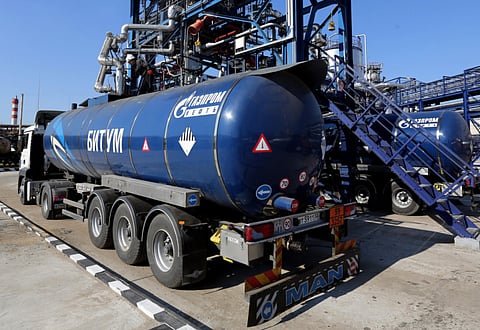Putin’s move boomerangs against him
Gazprom and the Russian government are less capable of withstanding the loss of the European market than vice versa

For years, Russian President Vladimir Putin has wielded Europe’s dependence on his country’s natural gas as a foreign-policy weapon, without fear of the European Union calling his bluff — until now. With the EU launching an antitrust case against the state-controlled gas conglomerate Gazprom, Europe has sent a clear signal that Putin’s brutishness is no longer as intimidating as it once was.
The message from the European Commissioner on Competition – that market rules apply to everyone – is one that Putin has dismissed for years. Reliance on economic and legal means to achieve his political goals has long been a hallmark of his rule. More than a decade ago, the Kremlin expropriated Yukos Oil, which at the time produced 20 per cent of Russia’s output, and jailed its founder, Mikhail Khodorkovsky, for ten years on trumped-up tax evasion charges after he dared to oppose Putin.
All major players in Russia’s energy-centric economy quickly fell into line politically, enabling Putin to use the country’s oil and gas exports as a geopolitical cudgel. EU countries that he could not intimidate militarily, owing to Nato, were wooed with discounts — or punished with price hikes.
Hungarian Prime Minister Victor Orban is Putin’s staunchest friend in Europe (though Greek Prime Minister Alexis Tsipras seems to want to change that), while Poland’s leaders have consistently warned that Russia could become a menace to the continent again. As a result, whereas Hungary pays Gazprom $260 (Dh954) per thousand cubic metres of gas, Poland pays $526 — the highest price in the EU.
The Poles have paid a steep price, but they were right. The downing of Malaysian Airlines Flight 17 over eastern Ukraine last July seemed to mark the beginning of the end of Russia’s reputation, such as it is, as a civilised country. And now there is the hearing, currently underway in London, into the murder of Alexander Litvenenko, a dissident ex-KGB officer. Early in that hearing, the barrister acting for Litvenenko’s family claimed that the evidence in the case led to Putin’s door.
Russia’s economy has already been reeling under western sanctions imposed in response to the Kremlin’s annexation of Crimea and continued aggression in eastern Ukraine. Output is expected to shrink by almost 4 per cent this year, and the country’s credit ratings have been reduced to “junk” or “near junk” status.
And now the European Commission is taking a page from Putin’s playbook. By seeking to punish Gazprom for its manipulation of energy prices, it is aiming a dagger at the heart of Putin’s regime. Moreover, the EU’s antitrust action seems to be part of a coordinated legal assault. Last summer, the Permanent Court of Arbitration in The Hague ruled that Russia must pay $50 billion to Yukos’s shareholders — a judgment expected to be upheld on appeal. In essence, the decision sent the same message as the EU’s anti-trust action against Gazprom: rules apply to everyone, and stolen property must be returned.
Of course, Europe could not easily withstand a 30 per cent cut in natural-gas deliveries if Putin ordered Gazprom to stop doing business there. But that is unlikely: Natural resources comprise 70 per cent of Russia’s exports, and transfers from Gazprom’s revenues alone account for at least 5 per cent of the national budget. Over the past decade, rising oil and gas prices fuelled rapid GDP growth, securing Putin’s popularity and giving him the resources to reconstruct Russia’s military might, now on display in Ukraine.
In other words, Gazprom (and the Russian government) are less capable of withstanding the loss of the European market than vice versa. Indeed, given the hard bargains that China has been driving during Putin’s desperate search for alternative buyers, threatening to cut exports to Europe has proven to be an exceedingly unwise tactic. A moment of truth is slowly approaching. Much of the world is working to reduce its dependence on volatile or unsavoury energy suppliers by adopting new technologies such as hydraulic fracturing and increasing purchases from places like Australia, Norway, Qatar, and the US, which has eased restrictions on the export of natural resources.
Whether Putin likes it or not, this trend will force him to become accountable for his actions. The EU may be unable to return Crimea to Ukraine, but its legal actions should put Putin on notice that his strong-arm tactics will not work for much longer.
Project Syndicate, 2015
Nina L. Khrushcheva is a dean at The New School in New York, and a senior fellow at the World Policy Institute, where she directs the Russia Project.


